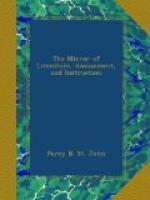Ina.
* * * * *
THE NOVELIST.
* * * * *
THE BACHELOR’S REVENGE.
(For the Mirror.)
Mr. Hardingham, or as some of his very intimate friends used to call him, Jack Hardingham, lived in a dull looking house in —— Square, his profession (the law) was dull, his fire and fireside were dull; and as he sat by the former one dull evening, in the dullest of all his dull humours, and of such the lonely bachelor had many, he sighed, kicked his shins, and looked into his books; but as that was like gazing upon a very ugly face, he shut them again, and rang the bell. It was answered by a portly dame, whose age might be about some four or five and forty, whose complexion was fair, whose chubby cheeks were brilliantly rosy, and whose black eyes were so vividly lustrous, that one might have fancied the delicate cap-border near them, in danger from their fire. Over her full-formed bust, she wore a clear, and stiffly-starched muslin habit-shirt of purest white, a beautiful lace-edged ruff around her throat, over her ample shoulders was thrown a fawn-coloured shawl, and she wore also, a silver gray gown of the material called Norwich crape, with an apron rivalling in whiteness cap, habit-shirt, and ruff. We are particular in describing the costume of this fair creature, because when dress is invariably the same, it has unity with person; it is identified with its wearer, and our affections even are caught and retained by it, in a manner of which few are aware. On the exterior of the lady whom we have endeavoured to portray, “housekeeper” was as indelibly stamped as the effigy of our king on the coin of the realm; and in a most soft and insinuating tone, she said, “Would you be pleased to want any thing, sir?”
“Yes, Mrs. Honeydew—go and ask if they can’t let me have De Vere.”




